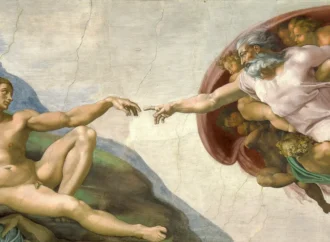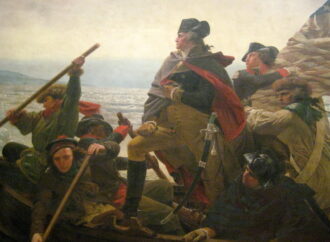People love to talk about the crisis facing America today, but few take a moment to consider all of the terrible challenges that the nation has faced. Millions of Americans can remember the Cuban Missile Crisis, the Vietnam War, stagflation, the crime waves of 1970s and 1980s, and any number of other disasters. So while the rule of law is certainly on shaky footing right now, there is always reason to hope in the continuation of the American experiment.
This was Abraham Lincoln’s conclusion when he surveyed a similarly depressing scene in 1838. Much like today, Americans in Lincoln’s time were worried about a breakdown in social order. As he said in a powerful speech to young men in Springfield, Illinois:
There is, even now, something of ill-omen, amongst us. I mean the increasing disregard for law which pervades the country; the growing disposition to substitute the wild and furious passions, in lieu of the sober judgment of Courts; and the worse than savage mobs, for the executive ministers of justice.
Lincoln’s words could be easily applied to many of the mob movements that have swept across America in the last four years. And as he argued, mob violence is a clear sign that the rule of law is fading. He thought these crimes, if left unchecked, would lead to general disregard for the government and, eventually, to chaos.
With hindsight, we know that Lincoln’s vision was spot-on. The mob violence of the 1830s eroded the authority of government, and soon after came the bloodiest war in American history. But if Lincoln’s diagnosis was correct, then what was his cure?
Lincoln thought that the only way that America’s institutions could survive is if the people developed a profound “reverence” for the law. Reverence isn’t a word that he used lightly. In fact, he spoke candidly of the need to create a “political religion” in America.
Lincoln saw that America was different than the monarchies of Europe. In Europe, the people were bound together by shared languages and cultures. Their loyalty was claimed by a human being, the king, who symbolized the unity of the people. All these bonds kept the countries of the old world from falling apart.
Americans, many of whom had emigrated from different European kingdoms, had none of those unifying traits to tie them together. What they did have was the American Revolution—but by 1838, those events were turning from memory to history. That’s why Lincoln was so intent on finding something that could possibly hold the nation together when the shared experience of the war for independence was lost.
Lincoln’s “political religion” was as simple and straightforward as it could be. As he put it:
Let reverence for the laws, be breathed by every American mother, to the lisping babe, that prattles on her lap—let it be taught in schools, in seminaries, and in colleges; let it be written in Primers, spelling books, and in Almanacs;—let it be preached from the pulpit, proclaimed in legislative halls, and enforced in courts of justice. And, in short, let it become the political religion of the nation; and let the old and the young, the rich and the poor, the grave and the gay, of all sexes and tongues, and colors and conditions, sacrifice unceasingly upon its altars.
It’s not clear how confident Lincoln was that his secular religion would prove powerful enough to hold the country together. As he said, “Reason, cold, calculating, unimpassioned reason, must furnish all the materials for our future support and defence.”
Other countries can rely on custom, on loyalty, on habit, but America is exceptional. It has nothing more than cold reason holding it together. In Lincoln’s day, that wasn’t enough to prevent war. As for today? That is up to us.
—
11 comments















11 Comments
Ronald Thomas
July 29, 2024, 3:52 pmOoo. Golly. Thank you Adam, for your elegant prose concerning Lincoln. Sorry to say that the rump of us committed Southerners feel about Lincoln's "political religion" mostly like we feel about Marx's or Stalin's. We really don't feel like Lincoln upheld any pre-existing American rule of law, and a lot of his opponents in the North felt the same. (Judges, newspaper editors, politicians). We have been and are convinced that Lincoln did not "hold the nation together." He clamped it together by violence, at the cost of the oldest section of the nation. That nation is coming unstuck, for want of the federalism that he destroyed, and his quiet magnificence in his own Apollonian temple doesn't change that. One need not viscerally dislike the man to consider that his temple might ultimately fare no better than the one at Delphi. Again, thank you for your writing, even if we might not agree. All the best, RT
REPLYDubs@Ronald Thomas
August 2, 2024, 9:40 pmI’m from NJ and feel exactly the same. He was the most tyrannical President in our history. It’s unsurprising the leftists and neoconservatives are his biggest fans today.
REPLYG.C. Howland@Ronald Thomas
August 9, 2024, 5:19 pmI see a whole generation of people who simply haven't stopped fighting the Civil War. No wonder there is still racial hatred in this country It never stopped – it just went underground for a little while.
President Andrew Johnson's behavior during the Reconstruction Era didn't help things any, nor did the radical republican responses to it. The tenet of White supremacy continued and poisons our waters even today. We need to find a way to get past the anger of the Civil War and the subsequent humiliation of the South. If we can't find a way around that, there will still be conflict no matter who sits in the White House and no matter who serves in Congress. We need to come to find peace with the root bases of this anger.
REPLYPauly G
July 29, 2024, 4:30 pmAmerica, comprising of a union of states, is not now, nor never has been a nation.
A national or centralized form of government was rejected in the Articles as well as the Constitution of 1787–the law Lincoln purposely and repeated broke.
It (National/centralized form of government) was rejected at the Philadelphia Convention, but more importantly, rejected by the state conventions which alone gave it any authority, and repudiated in the constitution as amended—the capstone of which is the 10th amendment.
There were no “rights” in the constitution as ratified, they were amended to get it passed. Why? To assure the states that only delegated powers were given and forbade the Congress to make any laws regard speech, etc.
When you free yourself of the false narrative of a nation as opposed to a federal union, Lincoln’s actions become transparent for what they were. (Thus is both difficult and unpopular—might even cost you a job or your reputation.)
A genocide of the states and a new fairytale that says a nation was born in 1776 has got us all mixed up.
Not even the articles, our first constitution, had passed in 1776.
This article is well written and certainly well intentioned. We just need to did a little deeper into who agreed to what and when to untangle this Gordian knot we call the United People of America. Oops! United STATES. If America.
REPLYKeep in writing. You are young and your instincts are admirable. Go to the source material and only the source material and you will find that most of what we have been taught is false. Sucks, but it is true..:
Patrick Easter
July 29, 2024, 11:12 pmThis is astounding, in view of current developments. Within his Presidency, which began with a congratulatory letter from Karl Marx, and ended with a plan, halted only by assassination, of reducing the Southern states to so many communal farms – as, later, realised by Lenin, it makes perfect sense.
REPLYDave Oslin
July 30, 2024, 7:54 amLincoln was a puppet doing the bidding of the New England oligarchy, who, from the beginning wanted a European style monarchy (and still do). They viewed themselves as royalty, far better that the citizens if the several states.More than 600,000 lives were needlessly lost in a war that had to do only with power and dominion, not the freeing of the slaves. For honest appraisals of the period I heartily recommend The Abbeville Institute, a scholarly think tank headquartered in Abbeville South Carolina. Another excellent source is the 1607 project which clearly details the incompatibility of the South with the North.
REPLYRobert Geist MD
July 30, 2024, 9:33 amSuperb piece. It explains Lincoln's using the Declaration as the time America was founded, not 1789 when the constitution was passed. His new "religion" brilliance was to link the two.
Thanks, Bob
REPLY